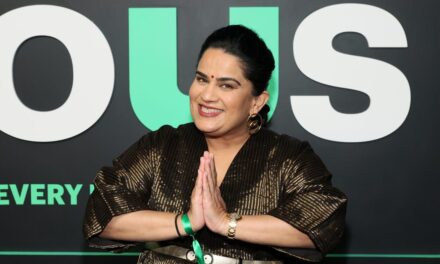Brett Cooper, a prominent figure in conservative circles and a rising star in the media landscape, recently recounted a surprising incident that took place during a party at the University of California, Los Angeles (UCLA). Known for her outspoken views on various social and political issues, Cooper’s experience serves as a reflection of the current polarized atmosphere in academic settings and beyond.
During the event, which was intended to be a gathering of like-minded individuals, Cooper found herself amidst hostility from attendees who held opposing viewpoints. In a dramatic turn of events, she was reportedly pelted with copies of ‘The Communist Manifesto,’ a historical text often cited in discussions about communism and socialism. This incident highlights the contentious nature of dialogue between differing ideological camps, especially within university environments that are typically viewed as bastions of free speech.
Cooper’s accounts of the party paint a picture of a microcosm of the larger societal debate surrounding free speech, academic freedom, and the right to express conservative viewpoints. UCLA, known for its liberal leaning, has been a battleground for political discourse, often resulting in confrontations between conservative and liberal students.
The event was ostensibly designed to foster discussion and camaraderie among conservatives on campus, providing a safe space for those who feel marginalized due to their beliefs. However, the presence of dissenting voices turned the gathering into a flashpoint for controversy. Cooper’s recounting of the incident speaks volumes about the tensions that characterize political discussions in today’s workplaces, universities, and public discourse.
In her commentary on the event, Cooper expressed frustration regarding the tactics employed by her opponents. Being targeted with a symbol of a political ideology she vehemently opposes was not only personally unsettling but also an emblem of the larger hostility faced by conservative figures in academic and liberal environments. The act of throwing ‘The Communist Manifesto’ at her served as a stark reminder that many are unwilling to engage in meaningful dialogue and instead opt for confrontational methods to silence opposing voices.
Cooper’s platform, which includes her popular videos and social media presence, often challenges ideas that are held dear by many on the left. She discusses everything from politics to gender issues, and as such has amassed a substantial following of those who resonate with her conservative messaging. This incident at UCLA raises questions about the role of educational institutions in promoting healthy debate and the responsibilities they bear in ensuring that all perspectives can be aired without fear of aggression or intimidation.
Witnesses to the incident reported a chaotic scene, with attendees divided between laughter and indignation. Some condemned the actions of those throwing the books, arguing that it not only disrespects the principles of free speech but also undercuts the possibility of genuine dialogue. Meanwhile, others voiced support for the actions taken against Cooper, viewing her as a figure emblematic of the perceived threat posed by conservative ideologies.
This clash reflects a broader trend observed at campuses across the United States, where debates over political speech have increasingly led to outbursts of aggression. The rise of social media has only exacerbated these tensions, allowing for the rapid dissemination of polarizing viewpoints and often reducing complex issues to sound bites that easily ignite outrage.
Conservative students on campus frequently express feeling isolated or attacked, creating an environment where open discussion becomes fraught with risk. Cooper’s experience at UCLA underscores the urgency for institutions to navigate the balance between protecting students from hostility and fostering robust debate. Universities traditionally pride themselves on being places of learning, inquiry, and representative expression, yet incidents like the one Cooper experienced suggest a growing divide that could undermine these principles.
In the wake of such incidents, the question arises: What measures should be implemented within educational institutions to safeguard against such confrontations? Advocacy for safe spaces is often at the forefront of discussions about free speech on campuses, but what does this mean for those on the other side of the ideological spectrum? Striking a balance that respects all viewpoints while minimizing offensive or harmful actions remains a challenge that many institutions grapple with daily.
Cooper has pledged to continue her advocacy for conservative viewpoints, emphasizing the importance of dialogue and engagement over aggression. Her experience illustrates her commitment to challenging the status quo and standing firm in her beliefs, even in the face of hostility. As more conservative figures step into the spotlight, the repercussions of events like the one at UCLA serve to galvanize support among those who may feel similarly besieged by liberal peers.
Looking forward, Cooper’s narrative invites a broader discussion about how society can accommodate contrasting ideologies without resorting to hostility or violence. While feelings may run high on both sides, the importance of discourse rooted in respect and understanding cannot be overstated. Universities must endeavor to facilitate environments where students can both advocate for their beliefs and engage with those who hold differing perspectives, ultimately enriching the educational experience.
Cooper’s anecdote serves as a critical reminder of the challenges that face many who dare to voice dissenting opinions. In navigating these difficult waters, it becomes increasingly essential for all parties involved to seek ways to bridge divides rather than deepen them. Each encounter between opposing sides presents an opportunity for learning, growth, and perhaps even common ground, should the parties involved be willing to engage thoughtfully and respectfully.
As the political landscape continues to evolve, the stakes for individuals and institutions alike have never been higher. The goal remains clear: fostering a climate that allows for the flourishing of diverse thoughts while combatting intolerance and aggression against any group, conservative or liberal. The path forward may be complicated, but through willingness to engage and reflect on these issues, progress can be made toward a more inclusive and understanding society.































